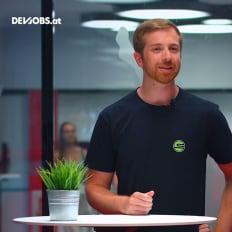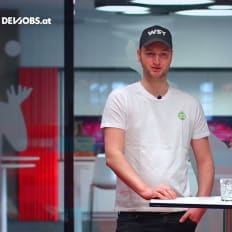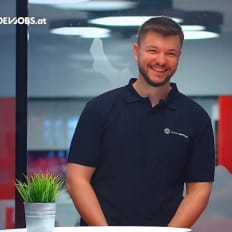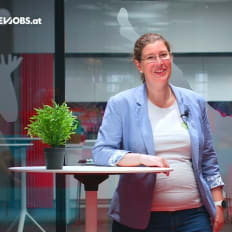
solvistas GmbH
Jochen Falkner, Senior Data Scientist bei solvistas
Description
Jochen Falkner von solvistas erzählt im Interview von seinem Weg in die IT, den Aufgaben als Senior Data Scientist und welche Ratschläge er Neueinsteigern mitgeben würde.
By playing the video, you agree to data transfer to YouTube and acknowledge the privacy policy.
Video Summary
In "Jochen Falkner, Senior Data Scientist bei solvistas," Speaker Jochen Falkner recounts how he moved from the HAC and military service, planned a law career, then pivoted to business informatics and joined solvistas after a recommendation—where he has stayed. He outlines how solvistas guides clients through the full data journey, from data collection to analysis, forecasting, evaluation, reporting, and building metadata models. He’s motivated by the friendly, family-like culture, and advises newcomers that a degree isn’t mandatory—focus on technical affinity, comfort spending time at the computer, and strong communication for requirements and presentations.
From Law Aspirations to a Full Data Journey: What “Jochen Falkner, Senior Data Scientist bei solvistas” Teaches About End-to-End Analytics, Team Culture, and Real-World Skills
A candid career path that makes sense in hindsight
Meeting “Jochen Falkner, Senior Data Scientist bei solvistas,” we were struck by the understated clarity of his story. No polished talking points—just a practical, honest trajectory: HAC, military service, and an original plan to study law. “I actually wanted to become a lawyer,” he recalls. Then came a grounded piece of advice: the job market for lawyers was tough. That external nudge was enough to re-route his path. Almost “overnight,” he switched to business informatics, studied it—and stuck with it.
What resonates with us at DevJobs.at is how pivotal decisions often arise from small, concrete prompts rather than grand visions. That willingness to move—decide, iterate, take the next sensible step—echoes the core of data work itself.
Chance, connection, belonging: finding solvistas GmbH and staying there
Jochen’s transition to solvistas GmbH was as simple as it was consequential. He mentions a personal connection—“über einen Spezial,” as he puts it. Later he crossed paths with the same person again; the suggestion was straightforward: “Why don’t you drop by?” He did—and “since then I’ve been at solvistas.”
The power of that anecdote lies not in a dramatic twist, but in the durability it sparked. He stayed because the environment fit. He stayed because the work and the people clicked. And he stayed long enough for the role to become a profession. In a field where frequent moves can be the norm, that kind of continuity is a strong signal.
The work: a data journey from source systems to evaluation
When Jochen describes his day-to-day, he consistently frames it as a “data journey.” His words are concise and telling:
“We accompany customers from the beginning—collecting data—through evaluating the data, analyzing, forecasting, assessing, building reports, building metadata models; in other words, a data journey from source systems to evaluation systems.”
That sequence is the backbone of his work. From our editorial viewpoint, it maps to a few core blocks:
- Collect data from source systems
- Prepare, ensure quality, and model data
- Analyze and assess
- Forecast (make predictions)
- Build reports and communicate results
- Build metadata models (the structure that holds it all together)
What stands out is the end-to-end responsibility. It’s not “just dashboards,” not “just ETL,” not “just ML.” It’s a cohesive flow with a clear aim: enabling decisions. Jochen doesn’t deliver a cascade of buzzwords—he outlines a coherent stream of work.
Project-dependent—and still predictable in logic
“It’s a bit project-dependent,” Jochen notes. That’s more than a polite caveat. Domains, data landscapes, and stakeholders vary—but the logic holds. The red thread is the data journey. It begins in raw source systems and ends where teams decide: with evaluations, reports, forecasts, and assessments. That is the structure solvistas follows—and the structure Jochen anchors in his role as a Senior Data Scientist.
For engineers, this matters: data work means navigating between disciplines. One day it’s data pipelines; the next, metadata semantics; then stakeholder presentations. The core doesn’t change—creating value across the entire lifecycle.
Team culture as a performance driver: “friendly, familial”
When Jochen talks about solvistas GmbH, he talks about people first. He describes the interactions as “friendly, familial,” and emphasizes how tangible it feels: “When you walk in, you can immediately sense that people know each other, have fun with the work, and have fun together—and that fully carries over into the work.”
We take two lessons from this:
1) Culture isn’t a poster. It’s lived, not declared. If a team genuinely enjoys working together, that has direct impact on output and quality.
2) Motivation is bigger than project content. Jochen says that “independent of the projects and customer topics,” it’s the team that motivates him—“cool and nice.” That’s not fluff; it’s a real productivity factor.
Skills over titles: you don’t necessarily need a degree
On the ever-relevant question of formal education, Jochen is direct: “I don’t think you necessarily need to do a degree.” He adds that younger colleagues “coming from HTL” sometimes “can do far more than what we learned at university.”
This isn’t an anti-academic stance. It’s a vote for ability over formality. If you grasp the subject and keep learning by doing, the data field is accessible—degree or not. That’s a door-opening perspective that speaks to potential rather than credentials.
Tech affinity matters—but the job isn’t only at the screen
Jochen strikes a balance. Yes, data roles mean “spending a lot of time at the computer.” Being tech-affine “can’t hurt.” But he immediately adds a counterweight: “Projects don’t only happen in front of the screen.” What matters just as much is interaction with people. He highlights:
- Defining requirements
- Understanding wishes and expectations
- Presenting results (“what you’ve built”)
- Keeping contact with people in the foreground
This balance encapsulates his role. We hear a realistic job portrait: a Senior Data Scientist is a bridge—between source and evaluation, between tech and domain, between algorithm and decision. Those who want only the terminal miss half the job; those who want only the stage miss the other half.
Metadata models: structure that makes everything hold
One specific element Jochen calls out is “building metadata models.” In many projects, metadata is treated as an afterthought. But it gives data work its form: it spells out what data means, how entities relate, and how information is used. The fact that Jochen places metadata models squarely in the data journey signals a commitment to sustainable architecture. Without agreed semantics and structure, analyses become brittle, forecasts debatable, and reports interpretable—but not reliable.
For engineers, the message is clear: invest in semantics and structure if you want long-term impact. It’s not just about pipelines, visualizations, or models—it’s about meaning.
Forecasting and assessing: turning analysis into decision
Jochen lists “analyzing, forecasting, assessing” side by side. That’s a methodical triad:
- Analyze: understand what is.
- Forecast: estimate what may come.
- Assess: decide what that means.
This sequence blends technique (analysis/forecast) with responsibility (assessment). It underscores why communication and stakeholder dialog are integral. Predictions realize their value only when they are comprehensible and actionable in decision contexts.
Present what you’ve built
“Presentations—what you’ve built.” The phrasing is simple, but it describes a core skill. Presenting isn’t showmanship; it’s translation. From Jochen’s remarks, we see three practical requirements:
- Explain clearly without hiding behind jargon.
- Address expectations (“wishes”) and be transparent about deviations.
- Translate results into the language of decisions: what will change as a result?
Strong presentation skills increase the leverage of your work—regardless of model complexity.
The end-to-end mindset as a career compass
Jochen’s sequence—from collecting to analyzing to reporting and metadata—is more than a checklist. It’s a posture: think end to end. As a career compass, that means:
- Be curious about the first meter (source systems) and the last (decision/presentation).
- Own the handoffs, not just “your piece.”
- Seek quality not only in code, but in how the results get used.
That posture makes seniority legible: it’s less about years, more about context breadth and reliability across the chain.
Practical takeaways for developers—rooted in Jochen’s remarks
From Jochen’s concise points, we at DevJobs.at derive a few recommendations:
1) Follow real interest, not an idealized job label. Jochen’s pragmatic pivot (“almost overnight” to business informatics) opened doors that lasted.
2) Seek end-to-end exposure. Don’t limit yourself to one segment of data work—trace it from raw inputs to reporting.
3) Make communication a practice. Facilitate requirement sessions, presentation run-throughs, expectation management. “Projects don’t only happen in front of the screen.”
4) Don’t underestimate metadata. Models, terms, relationships—they are the scaffolding of analytics.
5) De-emphasize titles. Whether HTL, university, or self-taught—ability and learning velocity matter most.
6) Evaluate culture as a productivity variable. Notice how teams treat each other. “Friendly, familial” isn’t soft—it’s quality assurance.
How the data journey feels—an outline of the flow
Without citing specific customer projects, Jochen’s description suggests a repeatable flow:
- Start amid variety: source systems are heterogeneous, distributed, historically grown. The first step is collecting.
- Create order: check, structure, and model data. This is where reliability starts.
- Clarify meaning: metadata models give concepts form and bridge tech with domain.
- Generate insight: analyses surface patterns; forecasts project forward; assessments connect numbers to implications.
- Communicate outcomes: reports and presentations carry the essentials to decision-makers—clearly, for the intended audience, and with concrete next steps.
That’s the strength of end-to-end accompaniment as Jochen frames it: there is no “last mile” someone else will handle. It’s all part of the journey—and everything is connected.
Motivation that lasts: “the team”
Jochen’s words include a quiet pledge to continuity: “That’s why I’ve been there a long time, and I’ll probably be there for some time to come.” What keeps him isn’t a single project, but “the team—casual, cool, and nice.” The emphasis is telling. It places everyday collaboration at the center—and explains how a simple “drop by” turned into a long-term fit.
Why this perspective matters—for newcomers and veterans
If you’re entering the data field, Jochen’s points offer a clear, attainable benchmark:
- Be ready to spend serious time at the computer—and equally ready to spend time with people.
- Learn how data flows from source to decision—not just one slice of it.
- Build capability, not just certificates.
If you’re experienced, you’ll recognize the emphasis on metadata, assessment, and presentation: where data work endures, architecture and communication matter as much as algorithms.
Our conclusion: a realistic job portrait—and an invitation
Jochen’s account isn’t performative. It’s an invitation to look at your career honestly: Where do you come from? What can you already do? Where do you want to shoulder responsibility? His answers are pragmatic and people-centered. They outline what characterizes the work at solvistas GmbH—and why he stays: end-to-end responsibility, palpable team culture, room for diverse educational paths, and a job understanding that joins tech with dialog.
For those who want to move data and make it understandable; who treat metadata as structure rather than an afterthought; who enjoy deep work at the keyboard and equally value interaction—this “data journey” feels like home. That’s what “Jochen Falkner, Senior Data Scientist bei solvistas” communicates—clearly, grounded, and motivating.
More Dev Stories
solvistas GmbH Markus Hiesmair, Software Engineer bei solvistas
Markus Hiesmair von solvistas erzählt im Interview über seinen Werdegang als Software Engineer – angefangen von der Schulzeit bis hin zur aktuellen Arbeit – und gibt Tipps für Neueinsteiger.
Watch nowsolvistas GmbH Michaela Raab, Data Scientist bei solvistas
Michaela Raab von solvistas gibt im Interview Einblicke in ihren Background, sowie ihren aktuellen Job als Data Scientist und gibt Tipps für Neueinsteiger.
Watch nowsolvistas GmbH Fabian Weißenböck, Software Developer bei solvistas
Fabian Weißenböck von solvistas redet in seinem Interview über seine Anfänge mit dem Programmieren, was er aktuell in seiner Arbeit macht und was seiner Meinung nach wichtig für Beginner ist.
Watch nowsolvistas GmbH Theo Crazzolara, Data Engineer bei solvistas
Theo Crazzolara von solvistas gibt im Interview Einblicke in seine Anfänge mit dem Programmieren, was er täglich im Data Engineering zu tun hat und was seiner Meinung wichtig für Beginner ist.
Watch nowsolvistas GmbH Mateo Adzaga, UX Designer bei solvistas
Mateo Adzaga von solvistas redet im Interview über seine Tätigkeit als UX Designer, wie er damit begonnen hat und was er selbst gerne als Anfänger gewusst hätte.
Watch nowsolvistas GmbH Sophie Brückl, Product Owner bei solvistas
Sophie Brückl von solvistas teilt im Interview ihre Erfahrungen beim Wechsel vom Software Development hin zur aktuellen Arbeit als Product Owner und welche Tipps sie jenen gibt, die ähnliche Schritte planen.
Watch now







